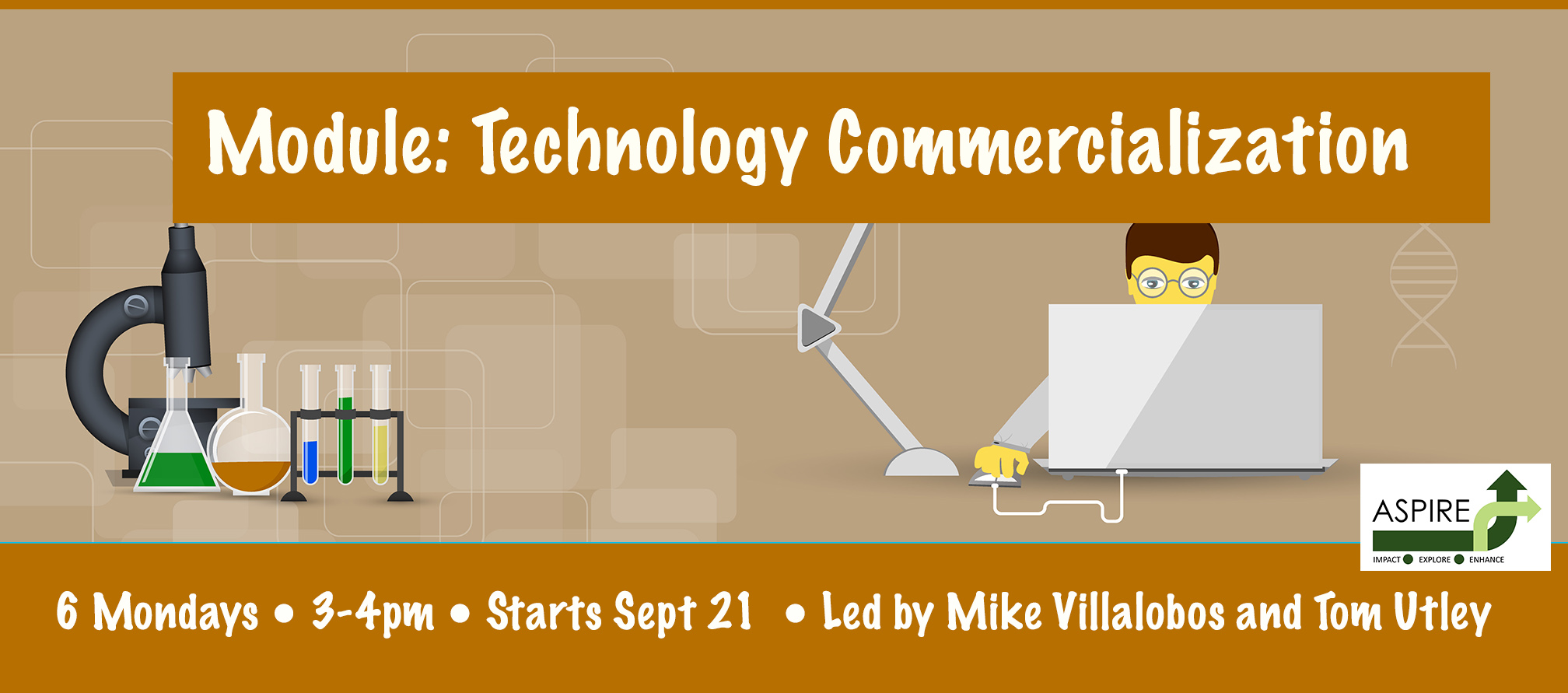2015 ASPIRE Module: Technology Commercialization
The ASPIRE Modules are short, non-credit bearing electives that broaden the training experiences of biomedical sciences trainees. These elective modules provide efficient exposure to topics in three theme areas: Business/Entrepreneurship, Communication, and Clinical research.The ASPIRE Modules are optional and open to any biomedical sciences PhD student or postdoctoral fellow who wishes to take them to supplement their research training. Class size may be limited, however, and will vary by module.
Module Title: Technology Commercialization
Director: Michael Villalobos, Ph.D., Manager, Biotech Licensing, and Thomas Utley, Ph.D., Licensing Officer, Vanderbilt Center for Technology Transfer and Commercialization
Time: Mondays, 3:00-4:00pm, September 21- October 26, 2015
Content: IP Fundamentals, federal statutes, academic technology commercialization process, translational research, early stage product development, entrepreneurship, new venture creation, sources of funding.
Class size: Not Limited
Registration requirement: 1-4 sentence interest statement for Instructor
REGISTER HERE.
Deadline: August 21, 2015
Syllabus
Commercialization of basic and applied research has become an increasingly important element of the mission of most US universities and academic medical centers. Commercialization of academic innovations enables the flow of resources to develop new and improved products for public benefit, contributes to local economic growth and creates new high value employment opportunities. The need for scientists to understand the fundamentals of technology protection and commercialization to be competitive for Government, foundation and industry funding is rapidly growing, and is a necessity for entrepreneurial researchers interested in working with technology-based new ventures. For those scientists looking for alternative careers to academia, this course will provide a foundational understanding of commercializing early stage technologies.
I. Societal impact of technology commercialization
II. Federal statutes covering ownership and commercialization of university inventions
III. Intellectual property fundamentals
IV. The academic technology commercialization process
V. Translational research and early stage product development
VI. Entrepreneurship and technology-based new venture creation
VII. Sources of funding available to academic researchers and entrepreneurs
Learning Objectives: At the conclusion of the class, students will be able to differentiate between ideas and inventions, and will be able to apply basic assessment principles to determine commercial feasibility of new innovations. Students will also be familiar with basic corporate and transactional documents, such as balance sheets, cap tables, term sheets and licensing agreements. Students will also be able to identify sources of early stage technology development and be armed with the means to pursue non-traditional funding sources.
Schedule:
| 9/21/2015 | Evolution and Impact of Technology Commercialization – Mike Villalobos
|
| 10/05/2015 | An Intellectual Property Primer – Tom Utley
· Types of intellectual property · Patent process · Ownership of IP |
| 10/12/2015 | Intellectual Property 2.0 – Tom Utley
· Patent prosecution timeline and costs · US vs Foreign · Case studies for business strategy |
| 10/19/2015 | Technology Commercialization 101 – Jody Hankins
· Academic commercialization strategies · Role of translation research · Early-stage product development |
| 10/26/2015 | Start-up company considerations – Rigved Joshi and Shawn Glinter |
| 11/02/2015 | Funding a startup company – Rigved Joshi |
| 11/09/2015 | FDA considerations – Axel Strombergsson |
